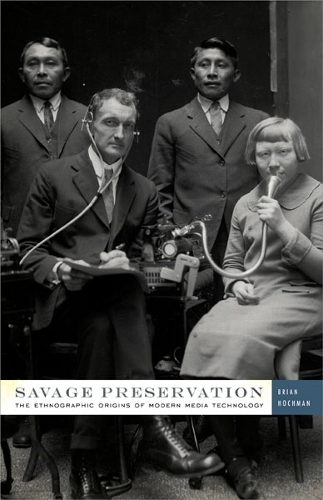
Savage Preservation: The Ethnographic Origins of Modern Media Technology
(Hardback)
Available Formats
Publishing Details
Savage Preservation: The Ethnographic Origins of Modern Media Technology
By (Author) Brian Hochman
University of Minnesota Press
University of Minnesota Press
1st January 2015
United States
Classifications
General
Non Fiction
Media studies
Indigenous peoples / Indigeneity
Social and cultural anthropology
305.8
Physical Properties
Hardback
312
Width 140mm, Height 216mm, Spine 38mm
Description
During the late nineteenth and early twentieth centuries, writers and anthropologists believed that the world's primitive races were on the brink of extinction. They also believed that films, photographs, and phonographic recordings--modern media in their technological infancy--could capture lasting relics of primitive life before it vanished into obscurity. For many Americans, the promise of media and the problem of race were inextricably linked. While professional ethnologists tried out early recording machines to preserve the sounds of authentic indigenous cultures, photographers and filmmakers hauled newfangled equipment into remote corners of the globe to document rituals and scenes that seemed destined to vanish forever.In "Savage Preservation," Brian Hochman shows how widespread interest in recording vanishing races and disappearing cultures influenced audiovisual innovation, experimentation, and use in the United States. Drawing extensively on seldom-seen archival sources--from phonetic alphabets and sign language drawings to wax cylinder recordings and early color photographs--Hochman uncovers the parallel histories of ethnography and technology in the turn-of-the-century period. While conventional wisdom suggests that media technologies work mostly to produce ideas about race, "Savage Preservation" reveals that the reverse has also been true. During this period, popular conceptions of race constructed the authority of new media technologies as reliable archives of the real. Brimming with nuanced critical insights and unexpected historical connections, "Savage Preservation" offers a new model for thinking about race and media in the American context--and a fresh take on a period of accelerated technological change that closely resembles our own.
Reviews
"Savage Preservation is an eye-opening account of the mutually entangled origins of ethnography and the meanings of modern media: recorded sound, color photography, documentary film. Not only does Brian Hochman enrich his readers sense of culture as a concept available to historical change, he demonstrates convincingly that North American media studies remains haunted at its core by the racial science of earlier generations." Lisa Gitelman, New York University
"The books intersection of technological development and evolutionist cultural theory make a valuable contribution to media history."Afterimage
"Refreshing and original."CHOICE
"Hochman crafts a compelling account of the unexpected ways in which race and new media technologies intersected during this era."MELUS
"Hochmans book is a clearly argued, broadly researched work with cogent case studies which should help to broaden our understanding of turn-of-the-century media and technology."History of Anthropology Newsletter
Author Bio
Brian Hochman is assistant professor of English at Georgetown University.
